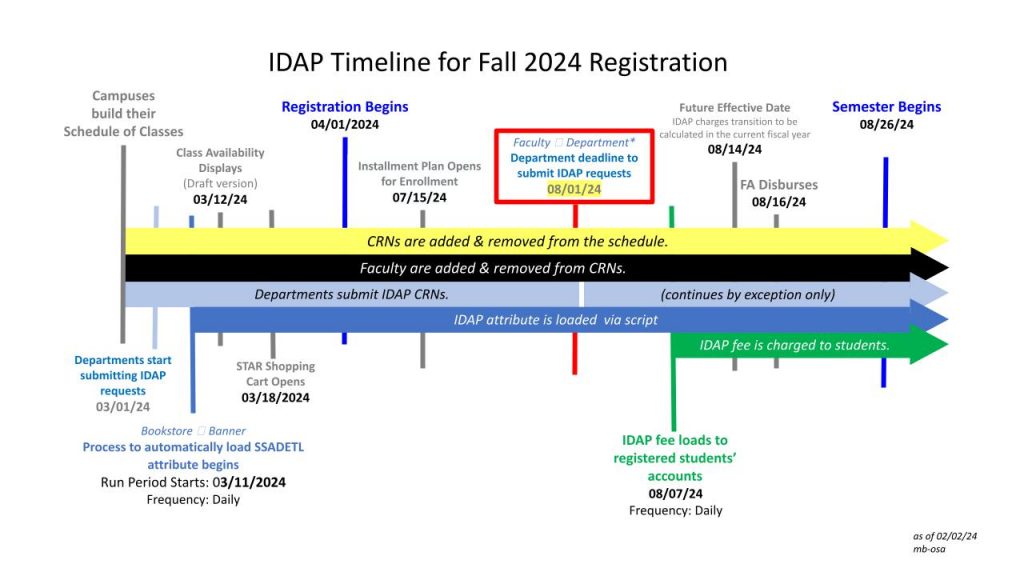IDAP (Interactive Digital Access Program)
The IDAP (Interactive Digital Access Program) is a University of Hawaiʻi partnership between the UH Bookstores and select publishers designed to provide students with affordable access to electronic textbooks and course materials. Digital access is provided to students in a rental format, expiring at the end of each semester. Unlike the traditional process in which a student actively purchases a coursebook by visiting the physical bookstore or the bookstore website, IDAP rental charges are internally attached to specific classes and automatically loaded onto each student’s MyUH account. While this website is designed for UH employees–and instructors in particular–students may learn more about the UH IDAP program through the UH Mānoa Bookstoreʻs IDAP website.
The IDAP timeline graphic for the Fall 2024 semester, posted above, provides a depiction of the key dates and steps in the process. Although there are many pieces to the puzzle, the date of financial aid disbursement is a primary factor driving the timeline to ensure student aid can be applied to IDAP charges before refunds are processed. The most important date for faculty members and lecturers to keep in mind is August 1. Although textbook orders for Fall 2024 were due to campus bookstores on March 1, and IDAP orders should ideally be submitted before that date, August 1 has been set as the deadlines after which point all late IDAP requests will require approval from the Vice Chancellor for Academic Affairs (or, in the case of UH Mānoa, from the Vice Provost for Academic Excellence) via an electronic form that will be made available prior to that date. Bookstore managers and employees will direct you to complete this form and will not process late IDAP requests without VCAA approval. This is a system-wide practice supported by the Council of Chief Academic Officers (CCAO), so each campus will follow this process.
Student Data Privacy
The University of Hawaiʻi is committed to protecting the data privacy rights of its students, as expressed in UH Executive Policy 2.219, Student Online Data Protection Requirements for Third Party Vendors. There is an inordinate number of digital publishers operating within the space of higher education with business models that feature the collection and transmission of student data to third parties, and this has become a topic of national conversation and concern. These companies offer instructors much more than electronic textbooks, as the publishers’ digital platforms typically include homework assignments, quizzes, exams, and sometimes even prefabricated PowerPoint slide decks. Although this range of services is understandably enticing, we ask faculty and lecturers to keep in mind that incorporating electronic materials into your course structure will often result in the disclosure of FERPA protected data to third parties. Fortunately, the risk to our students is significantly reduced when instructors participate in the University’s IDAP initiative, featuring publishers who have been vetted by the University. The University is working to continuously ensure they will abide by the terms of UH policy. Pursuing alternatives outside of IDAP will greatly increase the potential harm to your students. The seven official UH IDAP partners are as follows:
- Cengage
- John Wiley
- McGraw Hill
- Pearson
- W.W. Norton Publishing
- Top Hat Monocle
- VitalSource
Textbook Affordability
UH is also committed to textbook affordability as a means to support equity of access to students from diverse socioeconomic backgrounds and varying financial constraints. Although IDAP offers the possibility of reducing textbook costs for our students, there are other options available that do not pose the same data privacy risks. Specifically, there is a system-wide “Textbook Cost Zero” initiative that includes a “TXT0” class attribute, present in STAR GPS and on the class availability list, that notifies students of this feature. Recent semesters have seen more than 20% of all UH class offerings provide this benefit, with Leeward Community College consistently leading the pack, as witnessed by its 60.3% TXT0 adoption rate in Spring 2024. Much of this system-wide success has been achieved through the interrelated UH Open Educational Resources (OER) initiative, in which UH faculty generate coursebooks and other materials with the express intent of releasing them to the public domain so that they may be accessed free of cost and without licensing restrictions. Of course, the UH libraries also provide students and instructors with online access to a wealth of electronic textbooks and academic journal databases that students may access at no additional cost (beyond their tuition).
IDAP Process and Timeline
UH took steps to revamp its IDAP processes effective with the Spring 2024 semester in order to minimize adverse impact to students. Since the assessment of IDAP rental charges onto students’ accounts is automated, additional communication is required and timing is critical. In prior semesters, students had been negatively impacted when late IDAP charges were added to accounts after students/families had made full payment or financial aid had already been disbursed. In many situations, those late charges remain unpaid and turn into financial obligations that prevent the student from being able to register for the following semester. The changes implemented for Spring 2024 were undertaken in hopes of reducing the number of late IDAP charges to student accounts, thereby alleviating the financial obstacles that can hinder students’ timely progression to degree completion.
Spring 2025 Semester
This website will be updated with information for the Spring 2025 semester as that period approaches. After December 1, 2024, all late IDAP requests will require approval from the Vice Chancellor for Academic Affairs (or, in the case of UH Mānoa, from the Vice Provost for Academic Excellence).


